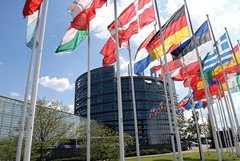EU Energy Efficiency Directive plans
 With the EU’s 2020 energy efficiency target in difficulty, a new Directive focuses on introducing obligation schemes for the public sector.
With the EU’s 2020 energy efficiency target in difficulty, a new Directive focuses on introducing obligation schemes for the public sector.
A new Energy Efficiency Directive has come into force which obliges member states to set a national target by 30 April 2013 and sets out a long-term strategy for renovating public and private residential and commercial building stock. The EU already has an energy efficiency target of reducing the projected level of energy consumption in 2020 by 20 per cent, but current national and European measures are predicted to deliver savings of only 9-10 per cent. The Council of the European Union believes that the new Directive’s measures will result in a 17 per cent reduction on 2020’s predicted demand.
The Directive emphasises the role of the public sector in driving up energy efficiency. From 1 January 2014, 3 per cent of the total floor area of heated and/or cooled buildings owned by central governments will have to be renovated each year. Member states may make alternative cost-effective measures, such as those for behavioural change of buildings occupants. Countries will be able to use allocations from the European Regional Development Fund to finance these works.
Member states will have to establish an energy efficiency obligation scheme, with energy distributors and/or retail energy sales companies (i.e. those delivering gas, electricity and heating oil) required to achieve savings equating to 1.5 per cent of annual energy sales to final customers by volume, averaged over January 2010 to January 2013.
Such schemes can include more efficient heating systems, double-glazed windows and insulated roofs. Energy use in transport may be excluded in calculations of savings. ‘Flexibility’ and ‘equivalent alternative’ measures for achieving the target (but not constituting more than 25 per cent of savings) will be allowed. ‘Equivalent alternative’ measures include:
- achieving the 1.5 per cent target in three stages, reaching the total in 2018;
- excluding energy sales from Emissions Trading Scheme-covered industries; and
- counting energy savings in the energy transformation (conversion of primary energy into end-use energy) and distribution sectors, and earlier actions (since 31 December 2008).
Policies may include an energy or carbon tax, financial incentives to encourage efficiency, measures to roll out energy-efficient technology and energy efficiency labelling schemes. Large companies will also be subject to regular, independent energy audits under the Directive. Audits will be carried out by qualified or accredited experts within three years of the Directive’s entry into force, and at least every four years from the date of the previous audit.
The Directive also targets consumer behaviour. Electricity billing will have to be based on actual consumption at least once a year. All sectors will be covered by this requirement i.e. including energy distributors, distribution system operators and retail energy sales companies.
High-efficiency co-generation (combined heat and power) and efficient district heating and cooling is promoted, with member states obliged to carry out an assessment of the potential from this technology by the end of 2015. This will include a cost-benefit analysis based on climatic conditions, economic and technical feasibility. Generation companies will also have to monitor efficiency levels. Combined heat and power can reduce energy use by 30 per cent compared to separate electricity and heat production.
Under the Programme for Government, the Housing Executive is charged with providing full double glazing to its housing stock by 2014-2015. While Social Development Minister Nelson McCausland temporarily suspended most double glazing installations earlier this year, claiming they lacked value-for-money, the Minister expects all 22,500 homes earmarked for the works to receive installations on time.
Linked with the Directive’s objective of energy savings is DETI’s proposed Energy Bill, due to be published next June. The Bill will contain a new energy efficiency obligation on energy companies i.e. a certain level of energy savings to be achieved every year.
Companies will be responsible for deciding how to achieve savings through measures such as installation of loft insulation in domestic homes.





